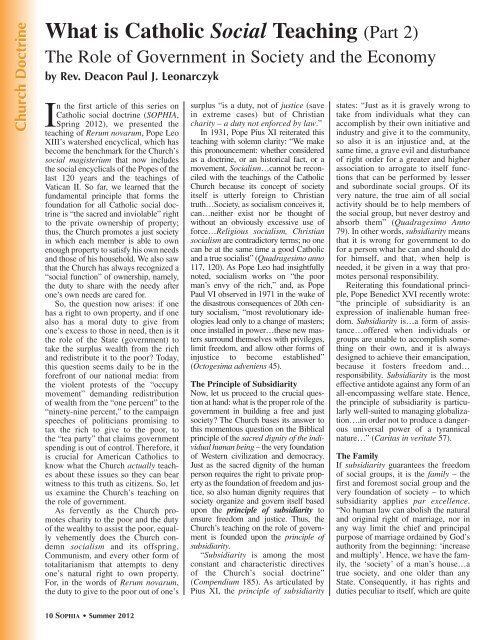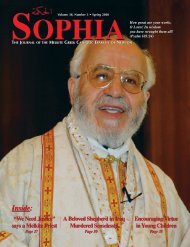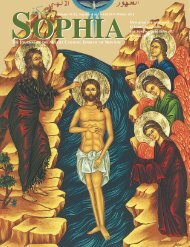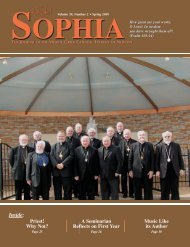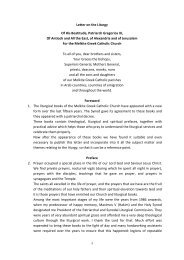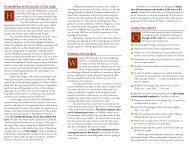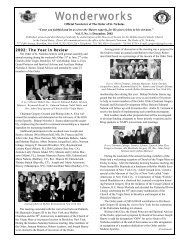Another Look at Repentance - Melkite Eparchy of Newton
Another Look at Repentance - Melkite Eparchy of Newton
Another Look at Repentance - Melkite Eparchy of Newton
- No tags were found...
You also want an ePaper? Increase the reach of your titles
YUMPU automatically turns print PDFs into web optimized ePapers that Google loves.
Church DoctrineWh<strong>at</strong> is C<strong>at</strong>holic Social Teaching (Part 2)The Role <strong>of</strong> Government in Society and the Economyby Rev. Deacon Paul J. LeonarczykIn the first article <strong>of</strong> this series onC<strong>at</strong>holic social doctrine (SOPHIA,Spring 2012), we presented theteaching <strong>of</strong> Rerum novarum, Pope LeoXIII’s w<strong>at</strong>ershed encyclical, which hasbecome the benchmark for the Church’ssocial magisterium th<strong>at</strong> now includesthe social encyclicals <strong>of</strong> the Popes <strong>of</strong> thelast 120 years and the teachings <strong>of</strong>V<strong>at</strong>ican II. So far, we learned th<strong>at</strong> thefundamental principle th<strong>at</strong> forms thefound<strong>at</strong>ion for all C<strong>at</strong>holic social doctrineis “the sacred and inviolable” rightto the priv<strong>at</strong>e ownership <strong>of</strong> property;thus, the Church promotes a just societyin which each member is able to ownenough property to s<strong>at</strong>isfy his own needsand those <strong>of</strong> his household. We also sawth<strong>at</strong> the Church has always recognized a“social function” <strong>of</strong> ownership, namely,the duty to share with the needy afterone’s own needs are cared for.So, the question now arises: if onehas a right to own property, and if onealso has a moral duty to give fromone’s excess to those in need, then is itthe role <strong>of</strong> the St<strong>at</strong>e (government) totake the surplus wealth from the richand redistribute it to the poor? Today,this question seems daily to be in theforefront <strong>of</strong> our n<strong>at</strong>ional media: fromthe violent protests <strong>of</strong> the “occupymovement” demanding redistribution<strong>of</strong> wealth from the “one percent” to the“ninety-nine percent,” to the campaignspeeches <strong>of</strong> politicians promising totax the rich to give to the poor, tothe “tea party” th<strong>at</strong> claims governmentspending is out <strong>of</strong> control. Therefore, itis crucial for American C<strong>at</strong>holics toknow wh<strong>at</strong> the Church actually teachesabout these issues so they can bearwitness to this truth as citizens. So, letus examine the Church’s teaching onthe role <strong>of</strong> government.As fervently as the Church promotescharity to the poor and the duty<strong>of</strong> the wealthy to assist the poor, equallyvehemently does the Church condemnsocialism and its <strong>of</strong>fspring,Communism, and every other form <strong>of</strong>totalitarianism th<strong>at</strong> <strong>at</strong>tempts to denyone’s n<strong>at</strong>ural right to own property.For, in the words <strong>of</strong> Rerum novarum,the duty to give to the poor out <strong>of</strong> one’ssurplus “is a duty, not <strong>of</strong> justice (savein extreme cases) but <strong>of</strong> Christiancharity – a duty not enforced by law.”In 1931, Pope Pius XI reiter<strong>at</strong>ed thisteaching with solemn clarity: “We makethis pronouncement: whether consideredas a doctrine, or an historical fact, or amovement, Socialism…cannot be reconciledwith the teachings <strong>of</strong> the C<strong>at</strong>holicChurch because its concept <strong>of</strong> societyitself is utterly foreign to Christiantruth…Society, as socialism conceives it,can…neither exist nor be thought <strong>of</strong>without an obviously excessive use <strong>of</strong>force…Religious socialism, Christiansocialism are contradictory terms; no onecan be <strong>at</strong> the same time a good C<strong>at</strong>holicand a true socialist” (Quadragesimo anno117, 120). As Pope Leo had insightfullynoted, socialism works on “the poorman’s envy <strong>of</strong> the rich,” and, as PopePaul VI observed in 1971 in the wake <strong>of</strong>the disastrous consequences <strong>of</strong> 20th centurysocialism, “most revolutionary ideologieslead only to a change <strong>of</strong> masters;once installed in power…these new masterssurround themselves with privileges,limit freedom, and allow other forms <strong>of</strong>injustice to become established”(Octogesima adveniens 45).The Principle <strong>of</strong> SubsidiarityNow, let us proceed to the crucial question<strong>at</strong> hand: wh<strong>at</strong> is the proper role <strong>of</strong> thegovernment in building a free and justsociety? The Church bases its answer tothis momentous question on the Biblicalprinciple <strong>of</strong> the sacred dignity <strong>of</strong> the individualhuman being – the very found<strong>at</strong>ion<strong>of</strong> Western civiliz<strong>at</strong>ion and democracy.Just as the sacred dignity <strong>of</strong> the humanperson requires the right to priv<strong>at</strong>e propertyas the found<strong>at</strong>ion <strong>of</strong> freedom and justice,so also human dignity requires th<strong>at</strong>society organize and govern itself basedupon the principle <strong>of</strong> subsidiarity toensure freedom and justice. Thus, theChurch’s teaching on the role <strong>of</strong> governmentis founded upon the principle <strong>of</strong>subsidiarity.“Subsidiarity is among the mostconstant and characteristic directives<strong>of</strong> the Church’s social doctrine”(Compendium 185). As articul<strong>at</strong>ed byPius XI, the principle <strong>of</strong> subsidiarityst<strong>at</strong>es: “Just as it is gravely wrong totake from individuals wh<strong>at</strong> they canaccomplish by their own initi<strong>at</strong>ive andindustry and give it to the community,so also it is an injustice and, <strong>at</strong> thesame time, a grave evil and disturbance<strong>of</strong> right order for a gre<strong>at</strong>er and higherassoci<strong>at</strong>ion to arrog<strong>at</strong>e to itself functionsth<strong>at</strong> can be performed by lesserand subordin<strong>at</strong>e social groups. Of itsvery n<strong>at</strong>ure, the true aim <strong>of</strong> all socialactivity should be to help members <strong>of</strong>the social group, but never destroy andabsorb them” (Quadragesimo Anno79). In other words, subsidiarity meansth<strong>at</strong> it is wrong for government to d<strong>of</strong>or a person wh<strong>at</strong> he can and should d<strong>of</strong>or himself, and th<strong>at</strong>, when help isneeded, it be given in a way th<strong>at</strong> promotespersonal responsibility.Reiter<strong>at</strong>ing this found<strong>at</strong>ional principle,Pope Benedict XVI recently wrote:“the principle <strong>of</strong> subsidiarity is anexpression <strong>of</strong> inalienable human freedom.Subsidiarity is…a form <strong>of</strong> assistance…<strong>of</strong>feredwhen individuals orgroups are unable to accomplish somethingon their own, and it is alwaysdesigned to achieve their emancip<strong>at</strong>ion,because it fosters freedom and…responsibility. Subsidiarity is the mosteffective antidote against any form <strong>of</strong> anall-encompassing welfare st<strong>at</strong>e. Hence,the principle <strong>of</strong> subsidiarity is particularlywell-suited to managing globaliz<strong>at</strong>ion….inorder not to produce a dangerousuniversal power <strong>of</strong> a tyrannicaln<strong>at</strong>ure…” (Caritas in verit<strong>at</strong>e 57).The FamilyIf subsidiarity guarantees the freedom<strong>of</strong> social groups, it is the family – thefirst and foremost social group and thevery found<strong>at</strong>ion <strong>of</strong> society – to whichsubsidiarity applies par excellence.“No human law can abolish the n<strong>at</strong>uraland original right <strong>of</strong> marriage, nor inany way limit the chief and principalpurpose <strong>of</strong> marriage ordained by God’sauthority from the beginning: ‘increaseand multiply’. Hence, we have the family,the ‘society’ <strong>of</strong> a man’s house…<strong>at</strong>rue society, and one older than anySt<strong>at</strong>e. Consequently, it has rights andduties peculiar to itself, which are quite10 SOPHIA • Summer 2012


